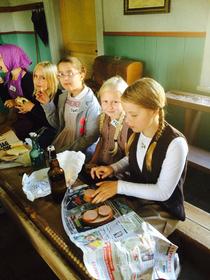Read more details about Buxton School on their 2025-26 profile page.
Reflections and Advice:
1.) What do you think makes your school unique relative to other boarding schools?
The most defining aspect of Buxton, in my eyes, was work program. Work program was a time twice a week when students perform the basic maintenance work of the school: cleaning, gardening, raking, chopping the wood to heat the buildings and so on. It helps build community and to connect students not just to the school as a group of students but to the school as a physical location that must be cared for, as well as creating a sense of shared responsibility and teaching new and useful skills.
2.) What was the best thing that happened to you in boarding school?
Buxton really allowed me to grow as a person. Before I came to Buxton, I had a very set idea of who I was: a theater kid and a nerd. Coming to Buxton allowed me to continue doing theater and academic work, but also allowed me to find other parts of myself. I found a love of gardening, and of visual arts. I forged close relationships with people I never would have approached in my public school and I ended up having strange, fun adventures that I never would have had otherwise. Buxton allowed me to become a more open-minded, less limited person, and shaped who I am today.
3.) What might you have done differently during your boarding school experience?
I was a day student and when I first came, I found it hard to really lean into the Buxton experience. I slept at home most nights, instead of at the school, which is an option for day students. I hung out with my old friends and didn't try very hard to make new ones. I wish i had really just jumped in that first year, and taken advantage of all Buxton had to offer, instead of standing on the sidelines until junior year.
4.) What did you like most about your school?
Buxton is a place where people feel good about liking things and being invested. It's cool to like your school and it's cool to show affection and it's cool to care very deeply about your art, about your schoolwork, about your friendships. It's a place where there's very little detachment or snarkiness, and the more people who can give in to that Buxton enthusiasm, the more lively and positive the community can be.
5.) Do you have any final words of wisdom for visiting or incoming students to your school?
Do as much as your schedule allows. Don't shy away from a class or an activity because you think you'll be bad at it. After Buxton, you'll only regret the things you didn't do, not the things you did.
Academics:
1.) Describe the academics at your school - what did you like most about it?
At Buxton, teachers are allowed to teach the topics they are most passionate about. This means there is an enthusiasm in the classroom that is passed from teacher to student, and that teachers really want their students to love what they are learning about, instead of just wanting their students to get an A.
Athletics:
1.) Describe the athletics at your school - what did you like most about it?
During the fall, students must participate in either soccer of "alternative sports", which we called A-sports. I did A-sports all three years, and enjoyed it. It was a small group of more alternative students, and we did things like taking hikes in the woods, playing volleyball, or doing yoga. It created an environment where one could find joy in exercise without feeling that they were being judged or expected to live up to certain expectations.
Art, Music, and Theatre:
1.) Describe the arts program at your school - what did you like most about it?
The arts programs at Buxton is incredibly unique. Almost every student is in some sort of art class, not because it is required, but rather because the programs are both high quality and inclusive. Art teachers try to follow their students' interest as much as possible, enabling them to create great art without prescribing what that art has to look like. They also do challenge their students, giving them ideas when they're stuck in a rut, recommending similar artists they might enjoy and gain inspiration from, encouraging students to collaborate with one another. This combination of challenge and comfort encourages students to create ambitious, exciting works, unlike those I've seen at another art school, or in most colleges.
Extracurricular Opportunities:
1.) Describe the extracurriculars offered at your school - what did you like most about it?
The extracurriculars at buxton are scattered throughout the day, which makes it possible to do theater and soccer, ceramics and African dance. This means extracurriculars are more diverse and les clique-y than at other schools I've been to. There is no such thing as a "theater kid" or a "music kid" or a "basketball kid", because you can do basketball and theatre and music.
Dorm Life:
1.) Describe the dorm life in your school - what did you like most about it?
At Buxton, a student lives in four different rooms in a year. While this may sound scary, it's actually an excellent system. It enables all new students to live with returning students in their first term, which means they have built-in friends and mentors who will help them find their place and feel comfortable. It also stops cliques from forming, since everyone gets to live with a large variety of different people. And, you're less likely to get sick of your roommate, because just as you are starting to get on each others' nerves, you get to change rooms!
Dining:
1.) Describe the dining arrangements at your school.
Our new chef Greg has been trying to really incorporate food grown in the school gardens into meals, which means we have a lot of fresh, local food, as well as helping students learn about where our food comes from and the work involved in that process.
Social and Town Life:
1.) Describe the school's town and surrounding area.
Williamstown is a small town with a disproportionate amount of culture. There are three art museums in a 15 minute radius, and Buxton students get in for free at all of them. Being close to Williams college also offers opportunities to take college classes in one's senior year, as well as bringing a variety of interesting talks and events to Williamstown.
2.) Describe the social life at your school - what did you like most about it?
Because the school is so small, students have to learn to get along with everybody, even people who have very different experiences and backgrounds. The smallness also inspires a tight sense of community and shared responsibility as well as helping to create some great friendships.
Read more details about Buxton School on their 2025-26 profile page.
Alumni Reviews Review School
Review
Description
The all school trip to a city in the U.S. or foreign country for a week to ten days during which students put on a play for the public and complete a project relevant to. . .
Buxton is a small and special school. They focus on the arts but are not technically an art school. It’s set on an old property and is very pretty. One of the special things, is. . .
For me, Buxton school felt like home away from home. I was a day student my first year, and was surprised at how quickly I realized that I wanted to board there. The feeling of. . .
Show more reviews (1 review)
Recent Articles

Pros & Cons of Boarding School in 2025
Explore the modern advantages and challenges of boarding school education in 2025—with insights on cost, well-being, diversity, and college outcomes.

Myths Debunked
Explore updated 2025 facts about boarding schools—cost, diversity, academic outcomes—and debunk common myths for parents and students.

Why Choose Boarding School in 2025 — Key Benefits & Realities
Explore why families opt for boarding school in 2025: rigorous academics, global networks, life skills, financial aid, and preparation for the future.





